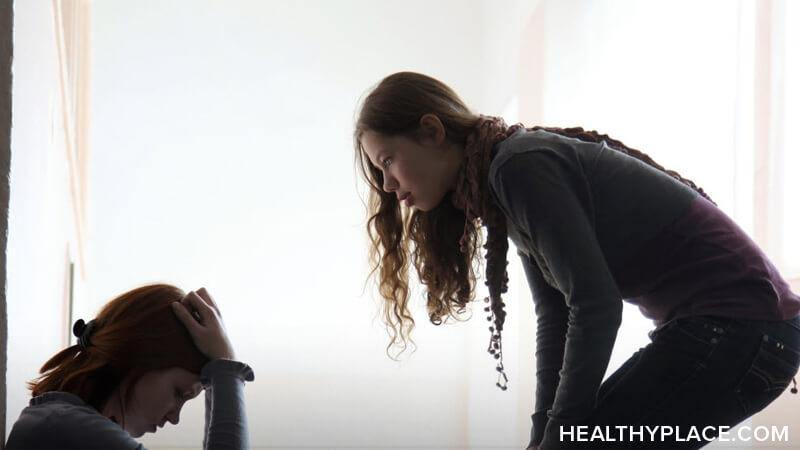Use Discretion When Discussing Your Depression

Discussing our depression can be beneficial; however, we should use discretion when deciding with whom we choose to discuss our depression. We also need to be mindful of how much detail we go into with people. Not everyone can be trusted with the most painful details of the lowest points of our depression. Many people are neither understanding nor supportive. In fact, some are even critical and judgmental. So, how can we decide what to share and with whom? Before discussing your depression with someone, consider the following points.
Points To Consider When Discussing Your Depression With Someone
- Trustworthy vs. Disloyal Before opening up about your depression to someone, you need to determine whether or not this person has earned your trust. Is he/she a safe place for you? Will what you share be kept private? You don't want to become the subject of gossip. Some of us learned this the hard way, and a trip or two through the rumor mill can lead to a recurring depressive episode.
- Understanding and Compassionate vs. Critical and Judgmental Does this person truly listen to you, rather than simply listening to respond? Does this person make your illness about him/her? Have you been told that your depression is caused by demons, lack of prayer, or because you watch too many horror movies or read too many scary books? Have you been told that your depression would go away if you quit wearing black clothes all the time or stopped all your self-pity? I've heard all of these things and more. These are not people I choose to discuss my depression with. They clearly have no compassion and absolutely no understanding of what depression is. It would be a waste of time to try to explain mental illness to them. I use my discretion and walk away from people like this. They are not worthy of our time or the strain they put on our mental health.
- Supportive vs. Unsupportive When deciding whether you should discuss your depression with someone, ask yourself if this person has been supportive. Does he/she encourage you to keep your therapy and doctor's appointments? If you take medication for your depression, does he/she support this? Does this person encourage you to practice self-care? If you answered no to any of these questions, then he/she is not a good candidate for you to discuss your depression with.
Finally, one quick way to use discretion in order to determine whether or not to discuss your depression with someone is to ask yourself the following question: "Do I feel better or worse after discussing my depression with this person?"
Watch this video to hear more about how I decide how much to share about my depression with certain people.
APA Reference
Smith, J.
(2019, September 26). Use Discretion When Discussing Your Depression, HealthyPlace. Retrieved
on 2026, March 3 from https://www.healthyplace.com/blogs/copingwithdepression/2019/9/use-discretion-when-discussing-your-depression
Author: Jennifer Smith
I really don't trust many people in knowing I am suffering with depression. I've lived a life I'm not proud of, because I did so much I regret. Abortions, alcohol ism, to the level of having to blow into my automobile in order to start it. Not sure of mom's diagnoses but to this day it's nothing but quarreling and
ugliness. My late father was an alcoholic but I didn't blame him as he had married mom. I've been to countless psychiatrists and have been diagnosed as borderline. I will not and cannot accept that, although it seems to be a perfect fit, I am so terribley ashamed of that label. I am so depressed.
I was diagnosed with bpd years ago as well and the way its talked about literally everywhere, Is that we are just like a narcissist....but its the total opposite. BPD means we feel far more intensely than normal people....meaning sadness feels like we are dying pretty much. Love is so intense as well. Narcissists feel nothing and dont care......sometimes it sounds better honestly. When you feel so much- life just hurts. I'm so tired and there is nothing I've found yet explaining why BPD shouldn't be demonized or shamed...or why we might be truly good people. Its disheartening. I am with you in this. I feel hopeless and need a reason to believe I can be as happy as anyobe else. As normal as anyone else. I can love me. Or that its not hopeless. I just nead a reason to believe so I have a reason to hang on.